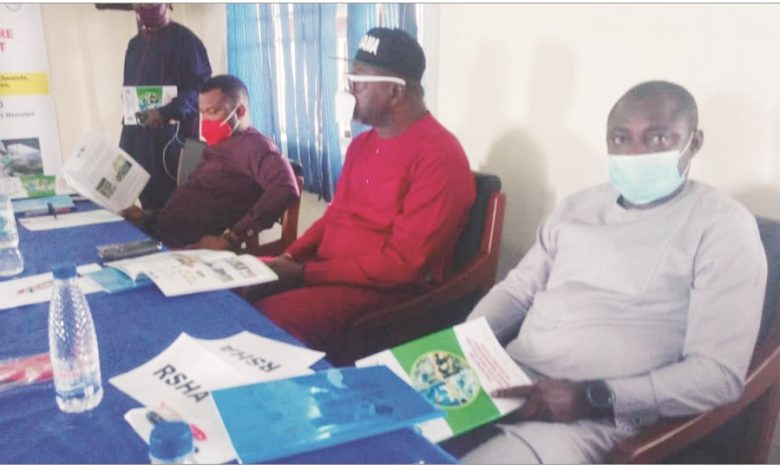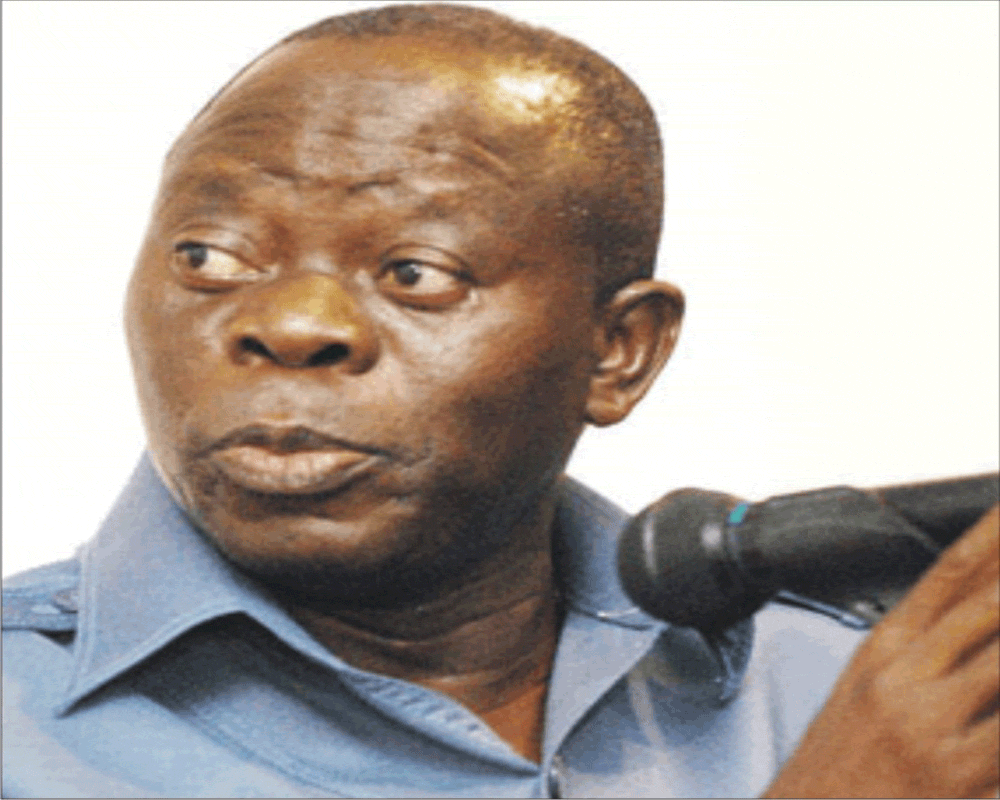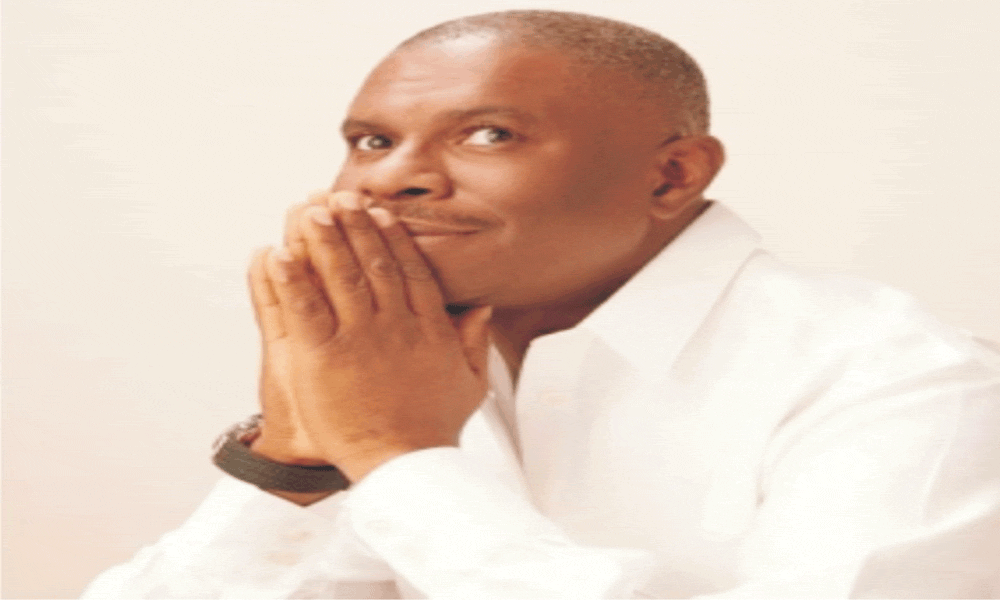Obuah Urges Collective Responsibility For Healthcare Waste Management

…As RIWAMA Charts Course For Clean, Healthy Environment
The Sole Administrator of the Rivers State Waste Management Agency (RIWAMA), Bro. Felix Obuah says the task of effective management of healthcare wastes in the State is a collective responsibility and not to be left for government alone.
He noted that the collective participation and synergy with RIWAMA would fast-track the achievement of set objectives of the Agency and engender a dirt-free, clean and healthy environment.
Speaking while declaring open a one-day workshop on Effective Healthcare Waste Management at the RIWAMA Premises, Km 6, Ikwerre Road, Port Harcourt on Thursday, Bro. Obuah said the calibre of resource persons engaged in the workshop showed the seriousness of the Agency to rejig the waste management delivery system in the State.
“This training workshop is to educate and equip us to render healthcare services without endangering our lives, that of our clients and patients and the larger communities. We shall be x-raying the legal burdens on generators and the intentions of the Agency in terms of scaling up our modus operandi for regulation, monitoring and waste audits”, he said.
“We are believing that at the end of this all-important workshop, our people will begin to think and do things in a new way, rather than thinking and doing things in the usual parochial ways they are used to. I am very convinced that those who listened to the lectures would have a rethink, knowing that whatever thing you put will come back to you”, he said.
While stressing that the summation of the lecture encapsulated the aphorism that ‘health is wealth’, the RIWAMA boss reiterated that it is not the responsibility of government to pay for the management of wastes generated by citizens.
“For the sake of protecting her people, government has gone out of the way to shoulder the responsibility of managing wastes. It is not the global best practice to consider waste management as utility”, he said.
Bro. Obuah posited that the industrial principle of ‘polluter pays’ is premised on the ground that waste is owned by the generator and that citizens owe it to themselves to be responsible and law abiding, adding, “They need to change and begin to exercise duty of care in managing waste products”.
He said as a responsible Agency, RIWAMA is committed to serving people of the State with respect to its environmental stewardship and performing the core objectives.

“These objectives include but not limited to: Provide an effective regulatory framework for waste management practices, taking into account current technologies to protect the environment from pollution; regulate waste generation, segregation, collection, treatment, recycling, and disposal with the aim of ensuring a safe, healthy and sustainable environment”, he said.
In his lead presentation, the National Consultant, Public Health and Environment, World Health Organization (WHO), Nigeria, Dr. Edwin Isotu Ede, warned on the implications of improper disposal of healthcare waste products.
“A broad range of materials which are hazardous ranging from used needles and syringes to soiled dressings, body parts, diagnostic samples, blood, chemicals, pharmaceuticals, medical devices, infectious and radioactive materials, generated from healthcare activities constitute healthcare waste.
“In 2016, WHO states that only 15% of total hospital waste are hazardous while the remaining 85% are non-hazardous. However, if the 15% hazardous hospital waste is not properly managed, the whole waste became 100% hazardous”, he disclosed, adding that this would be avoided if hazardous waste are segregated from source of generation and never mixed from source of generation to disposal.
The Public Health and Environment (PHE) expert revealed that globally, an estimated 16 billion injections are administered every year, but that not all of the needles and syringes are properly disposed, hence causing issues of public health importance such as preventable diseases.
Dr. Edeh whose presentation was done via a Zoom social media platform, cited the dreaded HIV/AIDS disease that could be contracted through healthcare wastes products that are not properly disposed.
“WHO noted that in 2010 alone, unsafe injections were responsible for as many as 33,800 new HIV infections, 1.7 million hepatitis B infections and 315,000 hepatitis C infections”, he said.
Emphasizing that good health is a function of a good waste management system, he warned that healthcare management should not be politicized.
“In 2012, the joint Federal Ministries of Health and Environment approved a healthcare waste management policy in Nigeria and presented same to the Federal Executive Council where it was equally approved. It was assumed that with this policy in place, healthcare waste management would improve.
“Unfortunately, more than 8 years has passed since the policy was approved, the situation has not improved in many states. Some states have incinerators that are not put to use or maintained periodically”, he noted.
Dr. Edeh commended the Sole Administrator, Rivers State Waste Management Agency (RIWAMA), Bro. Felix Obuah for his courage and wisdom to organize the training which according to him, is timely and germane for a healthier and cleaner Rivers State.

Other facilitators at the workshop include Dr. Ransome Richards West, Principal Counsel, Richards West and Co. Legal Practitioners, who spoke on the topic: Legal Burdens, Healthcare Waste Management, Extant Laws and legal implications for Generators.
He said the constitution provided for the maintenance of public conveniences, sewage and refuse disposal as the responsibility of government.
“For this purpose, each state in the federation has a duty to provide an effective legal and economically efficient framework for waste management that ensures the protection of the environment and human health”, he said, adding that this led to the establishment of RIWAMA with the responsibility to regulate waste generation, cleaning, separation, storage, collection, treatment, recycling, re-use and disposal of wastes, including healthcare wastes and also to control littering and illegal dumping of wastes. “This is geared to ensure a safe, healthy and sustainable environment for all in the State”, he said.
The legal practitioner while disclosing the classification of medical wastes as infectious, radioactive, hazardous and general wastes used his presentation to expose the inherent implications they pose to the health and wellbeing of the citizens, calling for caution.
Enumerating on the ‘Polluter pays principle’ in waste management, Dr. West said it enunciates a commonly accepted practice through enactments which make those parties who cause pollution to pay for the damages caused and the cost of managing or mitigating or preventing its effect on human health and the environment.
“The principle is based on the fact that though pollution is inevitable in human activities, the person or the organization that is responsible for them pay some money for the rehabilitation of the environment and compensation for the loss suffered by those impacted by the action”, he said.
Prof. Charles Tobin-West of the School of Public Health and College of Health Sciences, University of Port Harcourt spoke on Principles of Infection Prevention and Control in Healthcare and Waste Management.
He said infection control is about eliminating, minimizing or preventing the risk of acquiring infection during the provision of healthcare services.
Prof. Tobin-West also listed standard precautions while relating with all patients to include infection prevention precautions applied whenever providing patient care, despite the patient’s diagnosis; prevention of unprotected contact with body fluids, including blood, respiratory and other secretions and excretions; used for all contact with body fluids regardless of the presumed infection status; and minimizes or prevent spread of infection to healthcare workers, other patients and visitors.
“Patients not identified or not suspected of being infected with pathogens represent a substantial risk to other patients. For this reason, we have to treat all patients as if they have a potential infection”, he declared.
Pastor Sanitarian Walson Paminola, Director of training and capacity building, Environmental Health Essentials spoke on the topic: Environmental Health Perspective – Healthcare Waste Management and Hospital Sanitation.
According to him, liquid waste is also known as wastewater and can also be termed effluent.
He said that wastewater in the healthcare industry results from washing, cleaning, x-ray film washing, water carriage system, flood water etc.
H.A. Tobin-West, Managing Director of Environmental Health Essentials while speaking on the topic, Effective Regulation of Generators and Private Service Providers, Healthcare Waste Handling, Documentation, Data Management and Transportation, describes healthcare waste as the total waste stream from healthcare or research facility that includes both potential risk and non-risk waste materials.
Mr. Tobin-West who went on to classify healthcare waste into hazardous and non-hazardous, said waste handling requires the use of appropriate and adequate equipment and materials, especially PPEs, engagement of competent and professional private service providers, PSPs, who are professional waste managers with well-structured organizational and managerial procedures.
“The use of car-trackers may be imposed by RIWAMA for PSPs in the near future. PSPs must ensure end to end documentation and provide evidence of HCW destruction/treatment certification in addition to disposal receipts for the records of RIWAMA and other regulatory bodies as may be required by law”, he posited.
Another presenter, Dr. Sanitarian Newman K. Samuel (PhD) who spoke on the topic: Liquids and Gaseous Healthcare Waste – Healthcare Effluents and the Prevalence of Tissue Toxicity, Anti-Microbial Drug Resistant Strains, enumerated the characteristics of wastewater to include chemicals, lead, mercury, arsenic, chrome, aluminum, iron, chloride, suphate, pesticide, BOD, COD, physical, odour, taste, temperature, colour, biological, bacteria, viruses, algae, worms, snail, centipede and protozoa.
He explained the prevalence of tissue toxicity being responsible for lack of proper management of waste; lack of adequate knowledge; contamination of workers; contamination of food and water; discharge of wastewater into the environment and lack of effluent treatment plant.
Goodwill messages were presented at the workshop. The first salvo was fired by the Chairman, House Committee on Environment, Rivers State House of Assembly, Hon. Dumle Maol. He praised the Sole Administrator of RIWAMA, Bro. Felix Obuah, saying the Agency under his leadership has done a great job in keeping Rivers State and its environs clean and habitable.
He hailed the choice of Bro. Obuah by Governor Nyesom Wike to lead RIWAMA demonstrates the Governor’s love for a clean and healthy environment.
He criticized what he saw as indiscriminate dumping and disposal of healthcare wastes by healthcare service providers, urging them to be mindful of the dangers associated with the illegal dumping of wastes.
The goodwill message from the Hon. Commissioner for Environment, Dr. Igbiks Tamuno read among others: “The improper management of healthcare waste is a major environmental hazard and constitutes serious threat to the service providers.
“This training workshop is therefore necessary and apt to ensure clean and hazard free environment”.

The National Environmental Standards and Regulations Enforcement Agency (NESREA) in a message signed by Director, South-South Zonal Office, Ayuba F. Jacob read: “NESREA is happy to associate and collaborate with the Rivers State Waste Management Agency (RIWAMA) towards an effective healthcare waste management system in Rivers State”.
The Chairman of Nigerian Environmental Society (NES), Rivers State chapter, Dr. Kingsley C. Nwogbidi, in his message commended the tripartite initiative by RIWAMA to safeguard the environment, adding that the workshop was timely and apt as according to him, Rivers State and indeed Nigeria is facing series of environmental and waste management challenges waiting for action.
There were also messages of goodwill from the Pharmaceutical Society of Nigeria (PSN) and the Association of General and Private Medical Practitioners of Nigeria (AGPMPN) with lofty adulations for RIWAMA in doing a great job of enthroning laudable policies and programmes in keeping the state clean and healthy.
The workshop also had in attendance, principal officers of RIWAMA, other organizations from the health sector, National Association of Laboratory Scientists, and officials from the Ministries of Health and Environment respectively.



